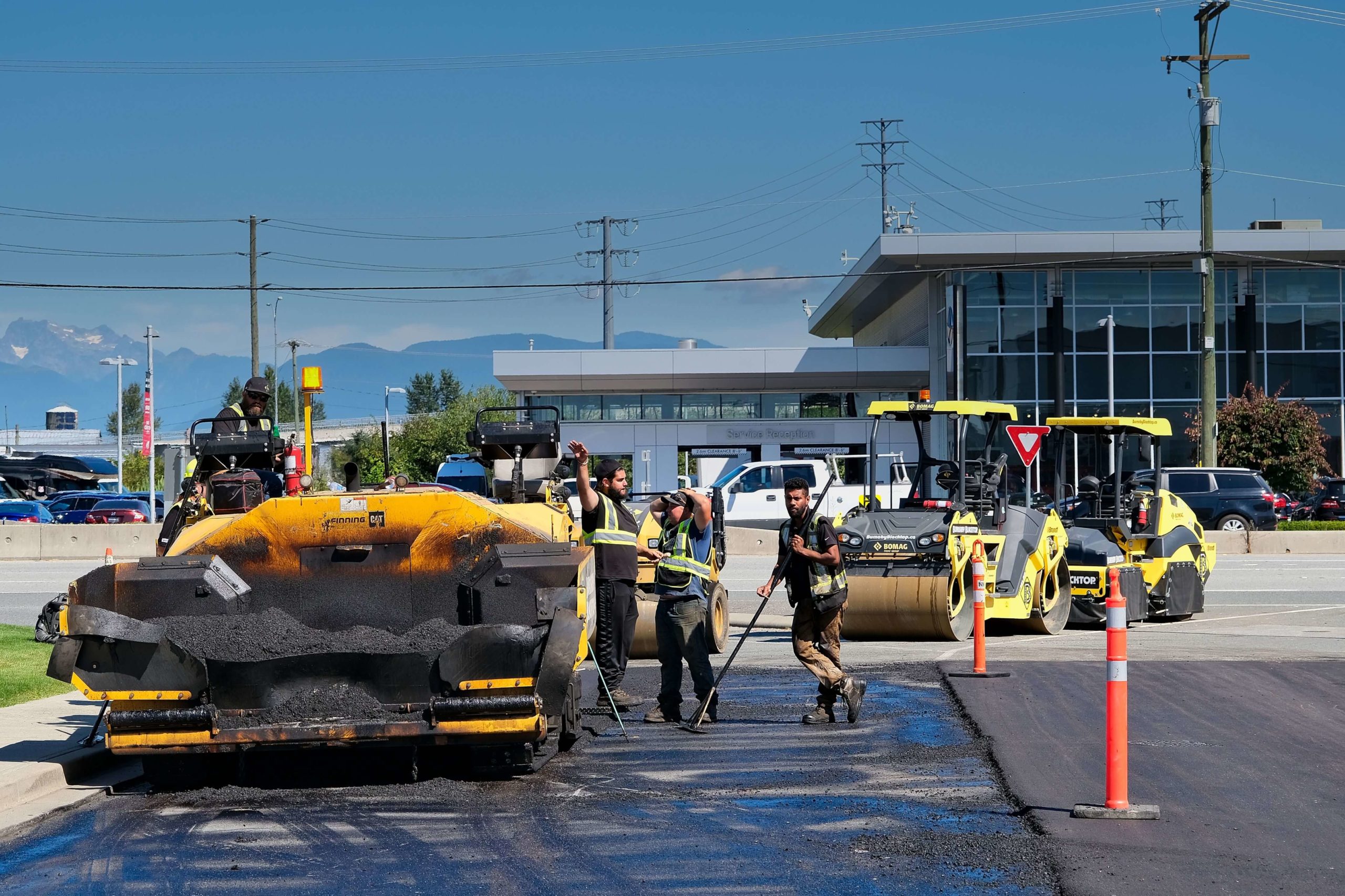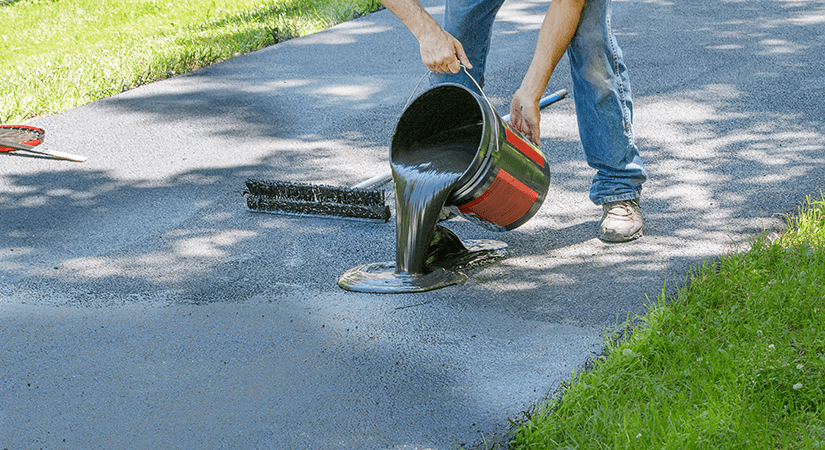Elevate Commercial Allure: Hot Mix Asphalt Sealing for Angled Parking Lots
Elevate Commercial Allure: Hot Mix Asphalt Sealing for Angled Parking Lots
Blog Article
Hot Mix Asphalt: A Sustainable Option for Pavement
Warm Mix Asphalt (HMA) has emerged as a leading lasting option for sidewalk remedies, providing a myriad of environmental advantages and cutting-edge modern technologies. As the demand for environment-friendly construction practices expands, checking out the subtleties of HMA's sustainability can give valuable insights right into the future of sidewalk solutions.
Environmental Benefits of Hot Mix Asphalt

Furthermore, Warm Mix Asphalt assists to mitigate urban heat island results. Its dark color takes in sunlight, decreasing the quantity of warm showed back right into the environment contrasted to lighter-colored sidewalks. This can lower ambient temperatures in urban locations, decreasing the need for air conditioning and inevitably minimizing power consumption.
Furthermore, Warm Mix Asphalt adds to improved stormwater management. Its permeable nature allows water to penetrate the sidewalk and reenergize groundwater materials, lowering drainage and the danger of flooding. These environmental benefits make Warm Mix Asphalt a lasting selection for leading roads and highways.
Power Efficiency in HMA Production
Is power effectiveness a crucial aspect in the manufacturing of Hot Mix Asphalt (HMA)? Power plays a substantial duty in the manufacturing of HMA, affecting both cost and ecological sustainability. One essential aspect of power performance in HMA manufacturing is the usage of cozy mix asphalt (WMA) innovations.
Additionally, innovations in plant technologies have actually resulted in even more energy-efficient HMA manufacturing processes. Modern plants are created with functions like recycled asphalt pavement (RAP) processing capabilities, reliable heater systems, and improved insulation, all contributing to power financial savings. By enhancing power usage in HMA manufacturing, the market can lower its carbon impact while keeping top quality pavement materials. Power effectiveness is, for that reason, a critical factor to consider in ensuring the sustainability of Warm Mix Asphalt manufacturing.
Recyclability of Hot Mix Asphalt
The recyclability of Hot Mix Asphalt (HMA) is a pivotal element of its sustainability and long-lasting ecological impact. HMA is just one of the most recycled products in the United States, with over 100 million bunches go to this web-site of reclaimed asphalt sidewalk (RAP) being recycled yearly in new sidewalk building and construction. Reusing HMA supplies numerous ecological advantages, such as lowering the demand for virgin materials, decreasing energy usage throughout production, and reducing the amount of waste sent to garbage dumps.
The procedure of recycling HMA includes milling the existing sidewalk, squashing it right into smaller sized items, and blending it with brand-new aggregate and asphalt binder to create a recycled mix. On the whole, the recyclability of HMA plays a substantial duty in promoting sustainable practices within the pavement market.

Long-Term Efficiency of HMA
Asphalt sidewalks demonstrate sturdiness and resilience over an extended period, reflecting the long-lasting efficiency of Hot Mix Asphalt (HMA) Additionally, innovations in HMA innovation, such as the usage of polymer-modified binders and warm mix asphalt, have actually further boosted the longevity and long life of HMA sidewalks. By focusing on top quality building and construction and upkeep techniques, HMA continues to verify itself as a cost-efficient and sustainable remedy for lasting pavement infrastructure.

HMA: Durability and Sustainability
Showing both resilience and sustainability, Warm Mix Asphalt (HMA) has actually come to be a foundation in the building of durable pavement infrastructures - regrading. HMA's resilience originates from its capability to stand up to hefty tons, harsh climate condition, and high traffic quantities, making it a trusted option for roads, freeways, and airport paths. The structure of HMA, which commonly consists of accumulations, binder, and filler, plays a vital duty in enhancing its longevity and resistance to deterioration
In addition, HMA's sustainability depends on its recyclability and energy-efficient production process. useful source The capacity to recycle recovered asphalt pavement (RAP) in brand-new HMA mixtures decreases the need for virgin products and reduces the environmental impact of pavement building and upkeep. Furthermore, the power efficiency of creating HMA depends on its lower mixing temperatures compared to other pavement materials, leading to reduced energy usage and greenhouse gas exhausts.
Final Thought
In final thought, hot mix asphalt (HMA) offers a lasting service for sidewalk with its eco pleasant features. HMA's recyclability, energy effectiveness in manufacturing, and long-lasting resilience make it an environmentally friendly selection for road building. By preserving natural deposits, reducing waste, and lowering greenhouse gas discharges, HMA plays a crucial duty in promoting sustainability in infrastructure development. Its capability to alleviate urban warmth island results better underscores its relevance in producing resistant and ecologically conscious sidewalk systems.
HMA is one of the most recycled materials in the United States, with over 100 million bunches of reclaimed asphalt pavement (RAP) being recycled annually in brand-new sidewalk construction.The process of recycling HMA entails grating the existing pavement, crushing it right into smaller sized pieces, and mixing it from this source with brand-new accumulation and asphalt binder to develop a recycled mix.Asphalt sidewalks show resilience and resilience over an extensive period, mirroring the long-term performance of Warm Mix Asphalt (HMA) Furthermore, advancements in HMA modern technology, such as the usage of polymer-modified binders and cozy mix asphalt, have further enhanced the toughness and durability of HMA pavements. The capability to reuse reclaimed asphalt pavement (RAP) in brand-new HMA blends lowers the need for virgin products and lessens the ecological impact of sidewalk construction and maintenance.
Report this page